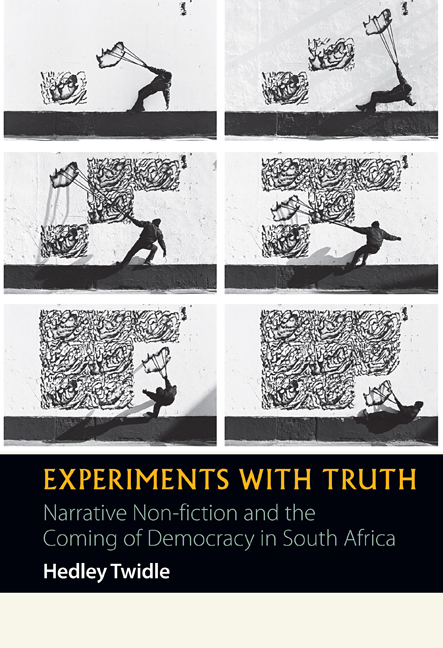Book contents
- Frontmatter
- Contents
- Preface: Encountering non-fiction
- 1 Introduction: Historical and theoretical approaches
- 2 Unusable pasts: The secret history of Demetrios Tsafendas: assassin, madman, messenger
- 3 Literatures of betrayal: Confession, collaboration and collapse in post-TRC narrative
- 4 In search of lost archives: Nostalgia, heterodoxy and the work of memory
- 5 A very strange relationship: Ambition, seduction and scandal in post-apartheid life writing
- 6 Some claim to intimacy: Political biography and the limits of the liberal imagination
- 7 In short, there are problems: Literary journalism in the postcolony
- 8 Unknowable communities: Necessary fictions and broken contracts in the heart of the country
- 9 A new more honest code: Memoirs of the ‘born frees’ and the futures of non-fiction
- 10 Afterword: The extracurriculum
- Bibliography
- Index
- Miscellaneous Endmatter
1 - Introduction: Historical and theoretical approaches
Published online by Cambridge University Press: 11 September 2020
- Frontmatter
- Contents
- Preface: Encountering non-fiction
- 1 Introduction: Historical and theoretical approaches
- 2 Unusable pasts: The secret history of Demetrios Tsafendas: assassin, madman, messenger
- 3 Literatures of betrayal: Confession, collaboration and collapse in post-TRC narrative
- 4 In search of lost archives: Nostalgia, heterodoxy and the work of memory
- 5 A very strange relationship: Ambition, seduction and scandal in post-apartheid life writing
- 6 Some claim to intimacy: Political biography and the limits of the liberal imagination
- 7 In short, there are problems: Literary journalism in the postcolony
- 8 Unknowable communities: Necessary fictions and broken contracts in the heart of the country
- 9 A new more honest code: Memoirs of the ‘born frees’ and the futures of non-fiction
- 10 Afterword: The extracurriculum
- Bibliography
- Index
- Miscellaneous Endmatter
Summary
Non-fiction: where to start with such a vague, negatively defined concept? Saying non-fiction is like calling a whole wardrobe of clothes non-socks, or using the apartheid term ‘non-white’. It takes a minority identity as a reference point to categorise a majority, and so implies a hierarchy of values. Most pieces of writing in existence, from recipes to tax returns to Wikipedia pages, are broadly non-fictional: that is, their makers and readers assume the function of words referring to actually existing elements of the world in which such texts are embedded.
And so, in order to narrow the focus of enquiry, an adjective is added: narrative non-fiction, creative non-fiction, literary non-fiction. Each of these multiplies the complications. Narrative non-fiction is non-specific; creative non-fiction sounds limited to the output of creative writing programmes. Literary non-fiction seems outdated and elitist, risking the discredited idea that literariness should be searched for as some privileged arena of discourse, or special added value.
The object of enquiry in this book is one that I have found hard to bring into focus or keep still. But I hope that such unsettledness can be generative, and that it might speak to a difficult place at a difficult time. The place is South Africa, the time two decades and counting since the country's first democratic elections in 1994. During this period of social and political transition, some of the most ambitious and compelling writing published within and about the country has emerged in non-fictive modes. The work of writers like Panashe Chigumadzi, Jacob Dlamini, Mark Gevisser, Pumla Gobodo-Madikizela, Antjie Krog, Sisonke Msimang, Njabulo Ndebele, Jonny Steinberg, Ivan Vladislavić and many others forms a body of cultural production that is ambitious, textured, imaginative and self-aware; that is sometimes experimental, often risky and troubling, often divisive – and worthy of more critical attention than it has received.
The work to follow is offered as the first book-length treatment of nonfictional form in modern South African literature. It reads a sequence of challenging documentary texts not simply as carriers of pre-existing information, but as ambitious and creative treatments of actuality. It considers a fuzzy set of narrative modes that are involved in orders of aesthetic selection and decision comparable to those that produce novels, short fiction, poetry and drama (genres that have traditionally been paid more attention by the discipline of literary studies).
- Type
- Chapter
- Information
- Experiments with TruthNarrative Non-fiction and the Coming of Democracy in South Africa, pp. 1 - 20Publisher: Boydell & BrewerPrint publication year: 2019

